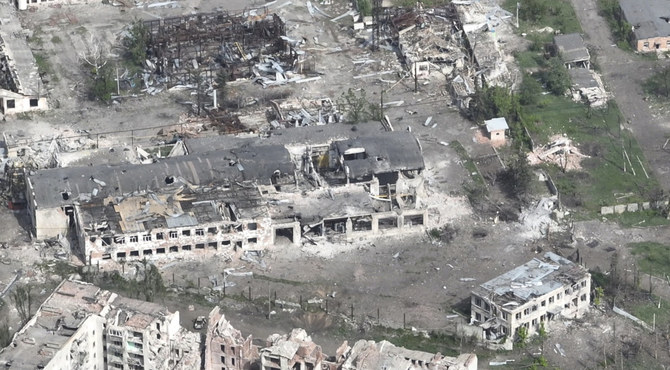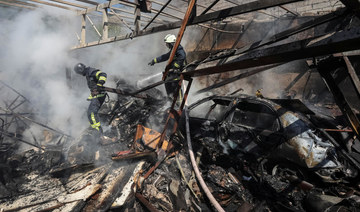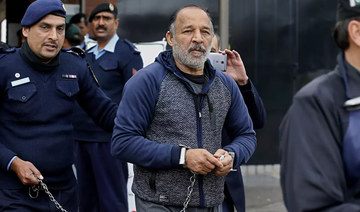NEW DELHI: The United States and India signed a defense agreement on Tuesday that will provide New Delhi access to classified satellite and sensor data available with the US security establishment, a major tool that is likely to have significant military ramifications for the region.
“We held a comprehensive discussion on a range of key issues,” Indian Defense Minister Rajnath Singh said at a news conference on Tuesday where he also described the signing of the Basic Exchange and Cooperation Agreement (BECA) between the two countries as “a significant move.”
“We identified projects for the joint development of defense equipment,” he continued. “We reaffirmed our commitment to peace and security of the Indo-Pacific region.”
The US and India signed the deal during the annual 2+2 dialogue between the defense and foreign ministers of the two countries amid escalating tensions and a “war-like situation” between New Delhi and Beijing in the disputed Himalayan region of Ladakh.
The situation also remains precarious in Kashmir where India and Pakistan frequently blame each another for cross-border skirmishes that injure and kill soldiers and civilians on both sides of the Line of Control.
Tuesday’s development follows 20 Indian soldiers losing their lives during a deadly clash in the Galwan Valley of Ladakh on June 15, breaking 45 years of peace at the Indo-China border.
Reaffirming its support for New Delhi in the faceoff with China, US Secretary of State Mike Pompeo told the media that his country would “stand with India in its efforts to defend its sovereignty.”
US Secretary of Defense Mark Esper added it was time to institutionalize cooperation between the two nations.
“Our focus now must be on institutionalizing and regularizing our cooperation to meet the challenges of the day and uphold the principles of a free and open Indo-Pacific well into the future,” Esper said in the meeting with the Indian delegation.
In 2016, Washington designated New Delhi as a “major defense partner” and signed the Logistics Exchange Memorandum of Agreement (LEMOA) which allows the militaries of both the countries to use their bases for strategic purposes.
Two years later, in 2018, the two nations signed the Communications Compatibility and Security Agreement (COMCASA) for “interoperability between the two militaries and sale of high-end technology from the US to India.”
Singh said that India’s “military to military cooperation” with the US was “moving forward very well,” as he described Tuesday’s deal as a “significant” step in the right direction.
“Signing the BECA today, after signing LEMOA in 2016 and COMCASA in 2018 is a significant achievement in that direction … of bilateral defense issues and larger regional and global perspective,” he said.
The US, for its part, threw the spotlight on “advanced” security and cooperation between the two allies.
“This year marks the 15th anniversary of the first US-India Defense Framework and our third 2+2 Ministerial. We have strengthened our defense and security partnership considerably since then ... We [also] advanced our regional security, military-to-military, and information-sharing cooperation,” Esper said.
Experts believe the BECA defense pact would “facilitate operational engagement” between the two nations.
“BECA will complete the four basic agreements that facilitate operational engagement between the armed forces of the two states,” Pranay Kotasthane, a strategic expert at Bengaluru-based think-tank, the Takshashila Institution, told Arab News.
He said that the agreement did not compromise India’s strategic autonomy as was “feared by some.”
“The keyword here is ‘facilitate.’ There is no loss of autonomy because of these agreements. India doesn’t become beholden to fighting American wars because of these agreements,” he added.
Former Indian ambassador Anil Wadhwa agreed, saying that the deal broke the past “hesitation” of sharing data between the two nations.
“It certainly strengthens close military and technical cooperation. There would be no hesitation in terms of changing data and selling of equipment based on geospatial information,” Wadhwa, who served as Indian ambassador to Italy, Poland, Oman and Thailand, told Arab News.
The 2+2 dialogue is a format to discuss defense and security issues between India and the US, and it aims at enhancing peace and stability across the Indo-Pacific region.
Launched in 2015, it replaces the India-US Strategic Dialogue which remained in place since 2009 and focused on regional security, economic cooperation, defense, trade, and climate challenges.
Underlining its importance, Indian Foreign Minister Subrahmanyam Jaishankar said on Tuesday: “Our national security convergences have obviously grown in a more multipolar world. We met today to not only advance our own interests but to ensure that our bilateral cooperation makes a positive contribution in the world arena.”
The timing and the intent of the defense pact, however, raises questions on whether India is preparing itself to counter China.
Some experts say that at a time when New Delhi should be trying to reconcile its differences with Beijing, the American “embrace would frighten China.”
“The USA will not come to help India to fight China. The only result from this kind of deal would be greater enmity ... We are creating a situation where we are leaving China with no other alternative but to declare war on India,” New Delhi-based political analyst Prem Shankar Jha told Arab News.
He added that “we are doing everything we can to frighten the Chinese, but this will further heighten the tension” between the two countries.
Wadhwa disagreed, however, saying: “If Beijing is not concerned about New Delhi’s sensitivity, why should India care?”
“The Chinese have not been sensitive to our concerns; they did what they wanted to do. They have been at the Indian territory in Ladakh which they have not done before. In that situation, we had no choice but to get the defense deal from whichever place it was available,” he told Arab News.
Kotasthane said that the defense deal would “balance China’s growing power and arrogance.”
“China has chosen to provoke India militarily,” he added. “Under such circumstances, it is prudent for India to balance China's growing power and arrogance by collaborating with other states on its own terms.”
US, India sign strategic security agreement amid anti-China rhetoric
https://arab.news/82jnx
US, India sign strategic security agreement amid anti-China rhetoric

- Secretary of State Pompeo reaffirms Washington's stance to support India in efforts to ‘defend its sovereignty’
- Some analysts in New Delhi remain skeptical to the American claim, saying that the deal will further escalate Indo-China tensions
Drone footage shows devastation in Ukraine’s strategic eastern city of Chasiv Yar as Russians advance

- The destruction is reminiscent of the cities of Bakhmut and Avdiivka, which Ukraine yielded after months of bombardment and huge losses for both sides
- Russia launched waves of assaults against Chasiv Yar’s outnumbered defenders as Ukraine's US and European allies dilly-dallied on sending fresh supplies
KYIV, Ukraine: Months of relentless Russian artillery pounding have devastated a strategic city in eastern Ukraine, new drone footage obtained by The Associated Press shows, with barely a building left intact, homes and municipal offices charred and a town that once had a population of 12,000 now all but deserted.
The footage shows Chasiv Yar — set amid green fields and woodland — pounded into an apocalyptic vista. The destruction is reminiscent of the cities of Bakhmut and Avdiivka, which Ukraine yielded after months of bombardment and huge losses for both sides.
The strategically important city has been under attack by Russian forces for months. Capturing it would give Russia control of a hilltop from which it can attack other cities that form the backbone of Ukraine’s eastern defenses.
That would set the stage for a potentially broader Russian offensive that Ukrainian officials say could come as early as this month.
Russia launched waves of assaults on foot and in armored vehicles at Chasiv Yar’s outnumbered Ukrainian troops, who have run desperately short of ammunition while waiting for the US and other allies to send fresh supplies.
Rows of mid-rise apartment blocks in Chasiv Yar have been blackened by blasts, punched through with holes or reduced to piles of timber and masonry. Houses and civic buildings are heavily damaged. The golden dome of a church remains intact but the building appears badly damaged.
No soldiers or civilians were seen in the footage shot Monday and exclusively obtained by the AP, apart from a lone man walking down the middle of a road between wrecked structures.
Regional Gov. Vadym Filashkin said Wednesday on Ukrainian TV that 682 residents have held on in Chasiv Yar, living in “very difficult conditions.” The city had a pre-war population of over 12,500. Filashkin said that those remaining have lacked running water and power for over a year, and that it is “ever more difficult” for humanitarian aid to reach them.
The destruction underscores Russia’s scorched-earth tactics throughout more than two years of war, as its troops have killed and displaced thousands of civilians.
NATO Secretary-General Jens Stoltenberg acknowledged Monday that the delayed delivery of allies’ military aid to Ukraine had left the country at the mercy of the Kremlin’s bigger and better-equipped forces.
Ukraine and its Western partners are racing to deploy critical new military aid that can help check the slow but steady Russian advance as well as thwart drone and missile attacks.
Elsewhere, Ukrainian authorities reported that two civilians died and at least nine others, included an 11-year-old boy, were wounded Wednesday after Russian aerial guided bombs pummeled a village in the northeastern Kharkiv region.
According to Gov. Oleh Syniehubov, a 64-year-old man and 38-year-old woman — both locals — were killed after one of the bombs detonated near their car in Zolochiv, some 20 kilometers (12 miles) from the border with Russia.
In the southern Black Sea port of Odesa, at least 13 people were wounded after a Russian ballistic missile slammed into the city late Wednesday, regional Gov. Oleh Kiper said in a Telegram update. He did not say what had been hit, but reported the blast had sparked a major fire.
Videos circulating on social media showed huge plumes of smoke rising skywards at the site. Nova Poshta, a large Ukrainian postal and courier company, said in a Facebook post Wednesday that one of its sorting depots had been struck, but claimed no employees were among those hurt.
Odesa has been a frequent target for Russian firepower, with eight civilians killed by Russian missiles in the city over the past two days.
UK police officer charged with showing support for Hamas

- Mohammed Adil, from Bradford in northern England, was arrested last November and charged following an investigation
- Adil, a police constable, has been suspended from his job with West Yorkshire Police and is due to appear in court on Thursday
LONDON: A British police officer has been charged with a terrorism offense for allegedly publishing an image in support of Hamas, a group banned in Britain as a terrorist organization, police said on Wednesday.
Mohammed Adil, 26, from Bradford in northern England, was arrested last November and charged following an investigation by British counter-terrorism officers, Counter Terrorism Policing North East said in a statement.
The police watchdog, the Independent Office for Police Conduct (IOPC), said the inquiries had focused on messages shared on WhatsApp which had concluded the case should be referred to prosecutors.
“On Monday, PC Mohammed Adil, 26, was charged with two counts of publishing an image in support of a proscribed organization, specifically Hamas, contrary to section 13 of the Terrorism Act,” the IOPC statement said. “The offenses are alleged to have taken place in October and November 2023.”
Adil, a police constable, has been suspended from his job with West Yorkshire Police and is due to appear before London Westminster Magistrates’ Court on Thursday.
Since the Oct. 7 attacks by Hamas on Israel, police have arrested and charged a number of people at pro-Palestinian protests in London for showing support for the group, while counter-terrorism commanders say they have also had a large amount of online content referred to them.
Family of 7-year-old girl trampled on boat while crossing Channel feared repatriation to Iraq

- Sara Alhashimi was crushed to death when a large group of men rushed onto an overloaded inflatable dinghy she had boarded with her parents and 2 siblings
- Her father says his family was told they were to be deported to his home country of Iraq after living in Europe for 14 years
LONDON: A seven-year-old Iraqi girl was crushed to death in a small, overcrowded boat as her family, who feared repatriation to Iraq after years living in Europe, attempted to cross the English Channel from France to the UK, the Guardian reported on Wednesday.
Sara Alhashimi was with her father Ahmed Alhashimi, mother Nour Al-Saeed, 13-year-old sister Rahaf and 8-year-old brother Hussam when they boarded an inflatable dinghy at Wimereux, south of Calais, last Tuesday.
But Alhashimi, 41, said that as it set sail, a large group of men rushed onboard and he lost his grip on his daughter. Unable to move because of the crush, he could not reach her and she was trampled. Four other people also died.
Alhashimi said he left Basra around 2010 after he was threatened by an armed group. Sara, his youngest child, was born in Belgium. The family had also lived in Sweden and submitted asylum applications to several EU countries but all were rejected. Their attempt to cross the channel last week was their fourth in two months since arriving in the Pas de Calais region, after police prevented the previous crossings.
Alhashimi told the BBC: “If I knew there was a 1 percent chance that I could keep the kids in Belgium or France or Sweden or Finland I would keep them there.
“All I wanted was for my kids to go to school. I didn’t want any assistance. My wife and I can work. I just wanted to protect them and their childhoods and their dignity.”
Smugglers promised a guaranteed place on a boat carrying 40 migrants for €1,500 ($1,600) per adult and €750 per child, Alhashimi said.
Sara was calm, he added, as he held her hand while they walked from a railway station and then hid in dunes overnight while waiting to board their vessel. The smugglers told the group to inflate the boat shortly before 6 a.m., carry it toward the shore and run as they approached the water.
As they did so, however, a teargas canister thrown by police went off beside them, Alhashimi said, and Sara began to scream. He had been carrying her on his shoulders but once inside the dinghy he put her down so he could help daughter Rahaf get onboard.
As he tried to reach Sara in the increasingly overcrowded boat, Alhashimi said he begged a Sudanese man, who had joined them at the last minute, to get out of the way. He even punched the man, with little effect.
“I just wanted him to move so I could pull my baby up,” he said. “That time was like death itself … We saw people dying. I saw how those men were behaving. They didn’t care who they were stepping on — a child, or someone’s head, young or old. People started to suffocate.
“I could not protect her. I will never forgive myself. But the sea was the only choice I had.”
Alhashimi said was only able to reach Sara after French rescuers had arrived at the boat and removed some of the 112 people onboard.
“I saw her head in the corner of the boat,” he said. “She was all blue. She was dead when we pulled her out. She wasn’t breathing.”
Belgium recently rejected an asylum claim by the family on the grounds that Basra was a safe place for them to return to. They had spent the past seven years living with a friend in Sweden.
“Everything that happened was against my will,” said Alhashimi. “I ran out of options. People blame me and say, ‘how could I risk my daughters?’ But I’ve spent 14 years in Europe and have been rejected.”
Colombia to cut diplomatic ties with Israel

- “Tomorrow (Thursday) diplomatic relations with the state of Israel will be severed... for having a genocidal president,” Petro told a May Day rally in Bogota
- Petro, Colombia’s first leftist president, has also asserted that “democratic peoples cannot allow Nazism to reestablish itself in international politics“
BOGOTA: Colombian President Gustavo Petro said Wednesday his country will sever diplomatic ties with Israel, whose leader he described as “genocidal” over its war in Gaza.
“Tomorrow (Thursday) diplomatic relations with the state of Israel will be severed... for having a genocidal president,” Petro, a harsh critic of the devastating war against Hamas, told a May Day rally in Bogota.
Petro has taken a critical stance on the Gaza assault that followed an unprecedented Hamas attack on southern Israel on October 7 — which resulted in the deaths of some 1,170 people, mostly civilians, according to Israeli figures.
In October, just days after the start of the war, Israel said it was “halting security exports” to Colombia after Petro accused Israeli Defense Minister Yoav Gallant of using language about the people of Gaza similar to what the “Nazis said of the Jews.”
Petro, Colombia’s first leftist president, has also asserted that “democratic peoples cannot allow Nazism to reestablish itself in international politics.”
In February, Petro suspended Israeli weapons purchases after dozens of people died in a scramble for food aid in the war-torn Palestinian territory — an event he said “is called genocide and recalls the Holocaust.”
In the October attack, Hamas militants also took about 250 hostages, 129 of whom remain in Gaza, including 34 Israel says are presumed dead.
Israel’s retaliatory offensive has killed at least 34,568 people in Gaza, mostly women and children, according to the health ministry in the Hamas-run territory.
UK auction house removes Egyptian skulls from sale after outcry

- Lawmaker condemns trade as ‘gross violation of human dignity’
- Items were part of collection owned by English archaeologist Augustus Pitt Rivers
LONDON: A UK auction house has removed 18 ancient Egyptian human skulls from sale amid condemnation by a member of Parliament, The Guardian reported.
Labour MP Bell Ribeiro-Addy said the sale of human remains for any purpose should be outlawed and described the trade as a “gross violation of human dignity.”
Semley Auctioneers in Dorset had listed the skulls with a guide price of £200-£300 ($250-$374) for each lot. The collection included 10 male skulls, five female and three of an uncertain sex.
Some of the skulls were listed as coming from Thebes and dating back to 1550 B.C.
They were originally collected by Augustus Henry Lane Fox Pitt Rivers, an English soldier and archaeologist who established the Pitt Rivers Museum in Oxford, which contains about 22,000 items.
After being housed at a separate private museum on his estate, the skulls were sold as part of a larger collection to his grandson, George Pitt Rivers, who was interned during the Second World War for supporting fascist leader Oswald Mosley.
Ribeiro-Addy said: “This despicable trade perpetuates a dark legacy of exploitation, colonialism and dehumanization. It is a gross violation of human dignity and an affront to the memory of those whose lives were unjustly taken, or whose final resting places were desecrated.
“We cannot allow profit to be made from the exploits of those who often hoped to find evidence for their racist ideology. It is imperative that we take decisive action to end such practices and ensure that the remains of those who were stolen from their homelands are respectfully repatriated.”
Britain has strict guidelines on the storage and treatment of human remains, but their sale is permitted provided they are obtained legally.
Saleroom, an online auction site, removed the skulls from sale after being contacted by The Guardian. Its website states that human remains are prohibited from sale.
A spokesperson said: “These items are legal for sale in the UK and are of archaeological and anthropological interest.
“However, after discussion with the auctioneer we have removed the items while we consider our position and wording of our policy.”
Prof. Dan Hicks, Pitt Rivers Museum’s curator of world archaeology, said: “This sale from a legacy colonial collection that was sold off in the last century shines a light on ethical standards in the art and antiquities market.
“I hope that this will inspire a new national conversation about the legality of selling human remains.”
Some of the skulls in the auction had been marked with phrenological measurements by the original collector, he said.
“The measurements of heads in order to try to define human types or racial type was something that Pitt Rivers was continuing to do with archaeological human remains in order to try to add to his interpretations of the past.”




















